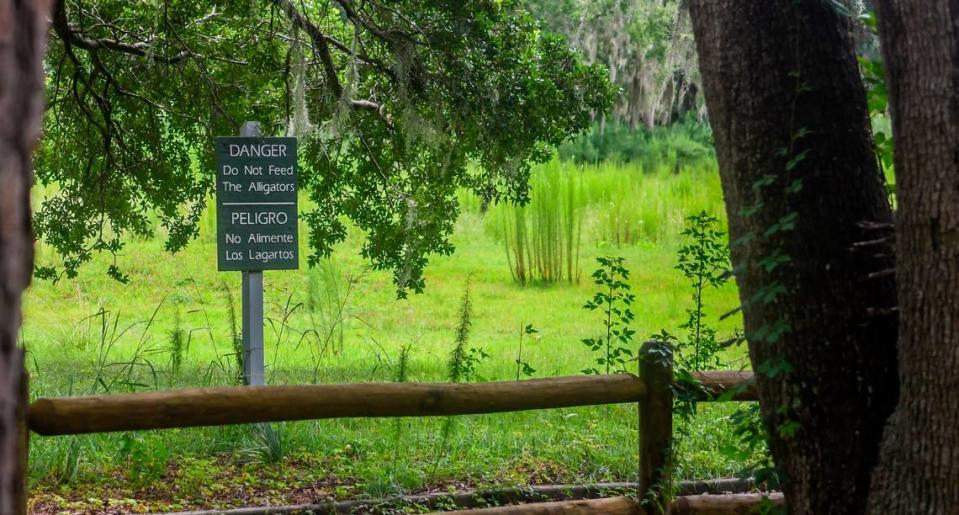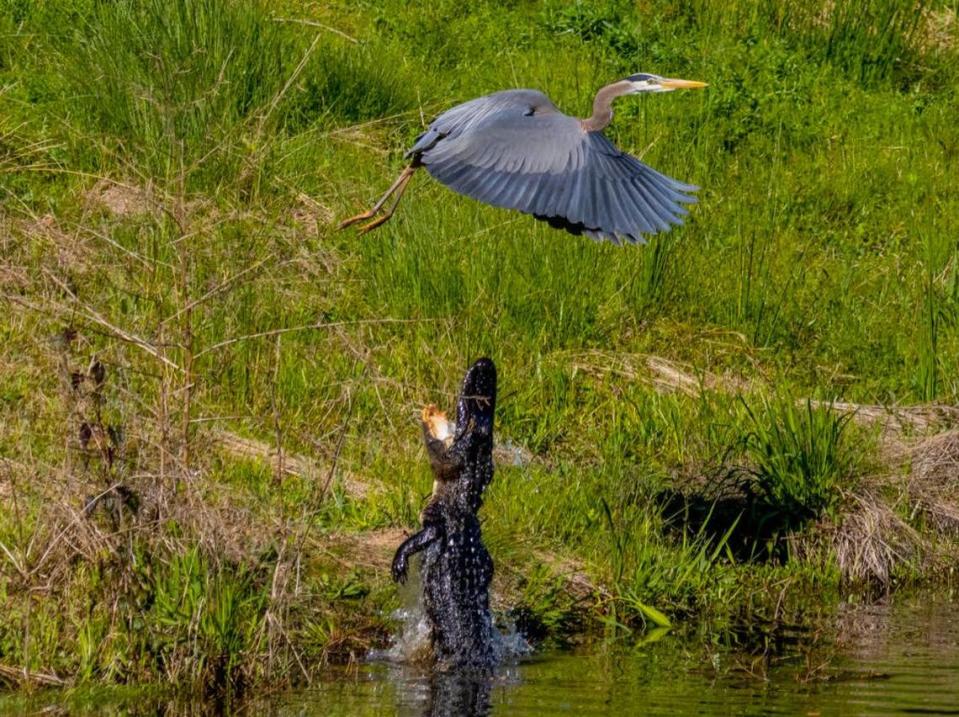Multiple instances of alligators killing unleashed pets in Hilton Head’s Sea Pines last month sparked a flurry of online posts claiming the reptiles are overpopulated in the Lowcountry. Biologists at the S.C. Department of Natural Resources say there are no issues with the current alligator population — but when it comes to preventing future attacks, the numbers get more complicated.
Despite being hunted close to extinction before being classified as an endangered species in 1967, American alligator populations in South Carolina have been “stable” since at least the late ‘90s, according to Morgan Hart, the alligator project leader for SCDNR. The species’ rebound was so successful that the state instituted a hunting season in 2008, which accounts for the yearly harvest of 300-400 gators across the state.
DNR estimates there are about 100,000 alligators total in South Carolina. Exact numbers are hard to come by, especially for individual counties and municipalities. Instead, scientists monitor the change in population size over time, which stays relatively consistent due to hunting seasons and other natural factors.
“It’s very difficult for an area to be overpopulated by alligators because big alligators eat little alligators, and smaller alligators are eaten by everything,” said Morgan Hart, the alligator project leader for DNR.
Beaufort County has seen seven alligator attacks in the last six years, three of which were fatal. The incidents have long sparked debate about whether the apex predators can coexist with residents.
Can gator hunting reduce attacks?
State environmental officials have chosen the September-October hunting period very carefully as to not interfere with the alligators’ nesting season. The permitted scope of each year’s hunt can vary; SCDNR issued 1,100 tags in 2022 as opposed to the usual 1,000.
But Hart said the yearly harvest numbers are very unlikely to have an impact on the prevalence of alligator-related incidents on Hilton Head and beyond, as the few hundred alligators that are hunted every year is a drop in the bucket relative to total populations. Instead, tags are issued in certain numbers to help manage public opinion after incidents of aggressive alligators.
“So it’s not that, ‘We looked at the population that year and there are more alligators; we’re going to do more tags,’” Hart said. “It’s more like, ‘The perception is we’ve got too many alligators, so we are willing to issue a few more tags to help with that perception.’”
The environmental agency’s alligator hunting season report for 2022 — the year 100 additional hunting permits were issued — says 50 extra tags were offered to both the Middle Coastal and Midlands units due to “increased negative interactions with alligators in the area.”
Hart added that whenever DNR issues an increased number of tags, experts are “confident” the slightly larger hunt won’t affect the population at large.
“There’s sort of a misconception that increasing the number of hunt tags would have an impact on how many people are having their dogs eaten … or nuisance alligator problems. These alligators living in neighborhoods are often not the alligators that are being targeted during the hunts,” Hart said, adding that hunting is only allowed in South Carolina’s navigable public waters.
In fact, hypothetical models of alligator populations in the U.S. show that hunters would have to decrease the gator population by more than 90% in order to completely prevent human interaction with nuisance alligators. “So the idea that we could remove animals to a point that people will be safe is not a functional idea,” Hart said.

Even still, any alligator displaying aggression or habituated behavior toward humans is euthanized by a licensed trapper, contributing to the few hundred alligators killed by humans per year in the Lowcountry. DNR data for Beaufort County says 85 and 82 nuisance alligators were harvested in 2023 and 2022, respectively.
Although local alligator populations aren’t rising, their interactions with humans are increasing as more people move into the Hilton Head area, according to Hart. Whether it’s a 10-foot behemoth crossing a busy roadway or a younger gator stuck in a drainage pipe, those encounters become more likely beginning in April of every year, as alligators emerge from their hibernation period known as brumation.
Here’s a list of SCDNR recommendations for alligator encounters:
-
Don’t feed alligators. Providing food for these wild animals makes them bolder and encourages them to seek out people.
-
Keep your distance. Although they may look slow and awkward, alligators are extremely powerful and can move with a startling burst of speed on land over short distances.
-
Do not attempt to move alligators out of the road. If you see an alligator on the move, leave it alone and let it pass on through. Alligators move the most in spring and summer when they are breeding.
-
It is illegal to harass or throw things at alligators. They are living organisms that warrant respect and it is not productive to annoy them.
-
Never disturb nests or small alligators. Some female alligators protect their young and may become aggressive if provoked.
-
Do not attempt to keep alligators as pets. Keeping a baby alligator as a pet is a foolish idea, not to mention illegal in some states.
-
Keep your pets and children away from alligators. Large alligators do not recognize the difference between domestic pets and wild food sources.
-
It is best to avoid swimming in areas that are known habitats for large alligators but at the least, never swim alone.
-
Do not corner alligators if participating in recreational activities, such as skiing, canoeing, kayaking, or even taking photographs.

Signup bonus from





